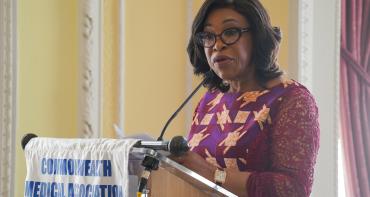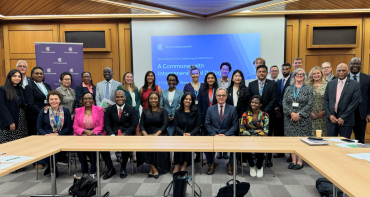Consumption of trans fat is closely linked to the increase in cardiovascular diseases and death. It is estimated to cause more than half a million deaths, globally, every year.

Ensuring trans fat elimination strategies are a focus for governments and reducing rates of Non-Communicable Diseases (NCDs) across the Commonwealth was the subject of a thought-provoking webinar hosted on 27 October by the Commonwealth Secretariat in collaboration with Resolve to Save Lives and the World Health Organization (WHO).
With one year left to achieve the global goal to eliminate industrially produced trans fat, the webinar brought together member countries, partner organisations and other key stakeholders to share best practices and resources to accelerate trans fat elimination.
It also marked the launch of the Secretariat’s new report, The Consequences of Inaction - The Case for Accelerating Trans Fat Elimination Efforts in the Commonwealth, which showcases global strategies and recommendations for the next steps towards fat elimination in the Commonwealth.
Reducing Rates of Non-Communicable Diseases
The Commonwealth has had a longstanding commitment to reducing NCDs. Opening the webinar, Dr Ruth Kattumuri, Senior Director of the Economic, Youth and Sustainable Development Directorate at the Commonwealth Secretariat, gave an overview on some core issues around trans fat, including how NCDs are now the Commonwealth’s leading killers with Small Island Developing States (SIDS) having unacceptably high rates of morbidity and mortality. However, she also noted that over the years, many Commonwealth countries have worked hard to address the rise of NCDs through legislative efforts, working closely with regional bodies and other partners.
“The elimination of trans fats is widely considered a low-hanging fruit, with the potential to prevent up to 17 million deaths by 2040.” – Dr Ruth Kattumuri
Dr Tom Frieden, President and CEO of the public health initiative Resolve to Save Lives, looked at how Commonwealth countries are working together to eliminate artificial trans fat. He noted that recent estimates show that some 200,000 deaths per year could be saved across the Commonwealth and that, currently, eight Commonwealth countries have adopted best practice policies, notably India, saving millions of lives over the coming years.

Trans Fats in the Global Food Supply
It is estimated that trans fat elimination could save 17 million lives by 2040. To facilitate the removal of trans fat from the global food supply by 2023, the World Health Organization (WHO) launched the REPLACE initiative in 2018 that aims to eliminate an NCD risk factor. Dr Chizuru Nishida, Unit Head for Safe, Healthy and Sustainable Diet at the WHO spoke about some of the research on the current landscape of trans fat policies in the Commonwealth and provided recommendations and proposals on reducing the intake of both saturated and trans fat.
Participants also heard interventions from across the Commonwealth including representatives from India (Dr Heena Yadav, Food Safety and Standards Authority of India), Canada (Chantal Martineau, Health Canada), and Tanzania (Dr. Hoyce Mshida, Tanzania Food and Nutrition Centre), as well as from the Caribbean regional body, CARICOM (Dr Karen Gordon-Boyle). They shared their experiences, at national and regional levels, to advance trans-fat policies. Dr Collin Zhuawu, Economic Advisor at the Commonwealth Secretariat provided insights from a trade perspective.

The webinar concluded that the elimination of trans fat can prevent millions of deaths worldwide and recommended that countries must work collaboratively - in a whole-of-government, multisectoral approach - to raise awareness and strengthen advocacy as part of efforts towards achieving the global commitment to eliminate trans fat from food supplies by 2023.
Read the report
Learn more about our health work
Media contact
- Angela Kolongo Communications Officer, Communications Division, Commonwealth Secretariat
- T: +44 7587 881503 | E-mail



